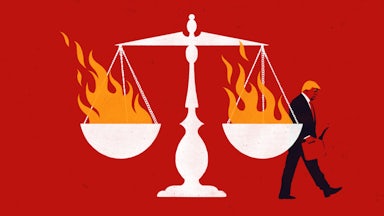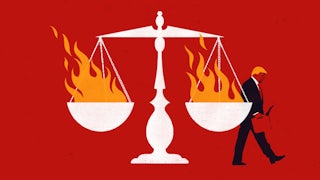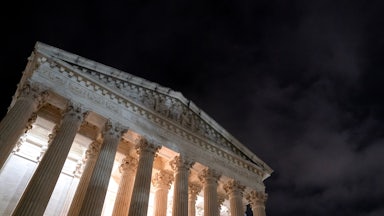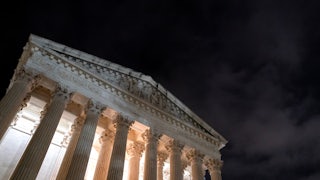As Republicans continue to obstruct Merrick Garland’s
nomination to serve as Joe Biden’s attorney general, it has been easy to forget
that scores of Justice Department positions remain filled by acting officials
and Trump holdovers. These include critical roles at Main Justice in
Washington, D.C.—the heads of the Criminal, National Security, and Antitrust
divisions, for instance—as well as all 93 of the U.S. attorneys who run the
crucial apparatus of federal prosecutors’ offices throughout the country. The
Biden administration is likely to replace most (if not all) of those U.S. attorneys in the months ahead, but this is a process that is not entirely within
its control: Senators and their staff—who review applications and conduct screening
interviews—typically have significant input in who will fill the top federal
prosecutor positions in their states.
One outstanding question that is likely to figure prominently in how progressives evaluate Biden’s eventual nominees is whether, and to what extent, the administration will try to address the unfortunate lack of racial diversity within the department, particularly in those top prosecutor positions. This is a long-standing problem that got strikingly worse under Donald Trump. Biden’s nominations of Lisa Monaco, Vanita Gupta, and Kristen Clarke for senior positions in the department have been a positive sign—that trio not only brings variety across lines of race and gender, they also happen to be as well-qualified a group as any you could assemble—but it remains to be seen how much progress the administration will make beyond these first big moves.
The lack of racial diversity among federal prosecutors is a significant problem, one that’s reflected throughout every segment of the legal profession. It has shown little sign of abating. A recent study once again confirmed the truly dismal state of affairs in the private sector: About 92 percent of law firm partners are white, just 2 percent are Black, and pretty much no one in a position of power seems to care. President Biden has the opportunity to reverse these trends, which would not just benefit the lawyers who are currently struggling to advance in their careers—it would significantly improve the world for the Justice Department’s legal clients: the American people.
I used to work at Paul, Weiss: a large, ostensibly liberal law firm in New York City whose principals never miss a chance to publicly pat themselves on the back for supporting high-profile liberal causes. That firm had a widely known, decades-long racism problem that prevented countless nonwhite lawyers from getting ahead, no matter how much better they were at their jobs than their white peers. Everyone knew this, but the firm’s leadership saw no reason even to pretend to care until The New York Times made it impossible to deny by publishing a prominent investigative piece two years ago—a scathing article that prompted self-aggrieved whining from the head of the firm. If anything, the Times’ dispatch understated how bad things had gotten.
But holding the private sector to account on these matters is a comparatively easier lift. Data on diversity in the Justice Department is harder to come by because the department does not release statistics on the subject. Nevertheless, the information that is available suggests that while things are better than in the private sector, it’s not by much. Last year, BuzzFeed’s Zoe Tillman found that just seven of the 93 U.S. attorneys at the time were nonwhite. These problems weren’t as pronounced in the top ranks during the Obama administration, but the broad lack of diversity nevertheless persisted at every level even then. In 2015, for instance, Stanford Law School released a study that found that just 13 percent of all assistant U.S. attorneys were Black or Latino.
Self-reinforcing, racially skewed patterns of promotion in the department make things even worse. During my time at the Justice Department’s 150-lawyer criminal fraud section, every single person in the most senior positions was white, and at the time of my departure, there was just one other nonwhite line attorney in the roughly 40-person unit in which I worked. In 2019, my unit promoted seven people internally to managerial positions, and all of them were white. (For the record, I did not apply.) One of them had been in the office for about a year after spending a few years at a U.S. attorney’s office, and it was no secret that he got the promotion because he was friends with the guy (also white) who ran the section. (They met while losing a major trial together, which is supposed to be a bad thing.) Last year, the same person tried to persuade a court to rule against two defendants on a critical pretrial issue because they were invoking too many of their constitutional rights at the same time—high-order legal gibberish that fortunately did not carry the day, but bumbling and embarrassing nonsense all the same.
Even well-meaning reformers seem to have conspicuous blind spots. Last year, a group of former senior Justice Department officials from Democratic administrations released an outline for post-Trump reform that argued, among other things, that the department “needs to do everything possible to ensure that a diverse pool of talented, committed, honorable individuals is aware of opportunities for DOJ employment, finds them appealing, and actually applies for jobs.” True enough, but the report said nothing about ensuring that these people have a fair shot at promotions after they spend some time at the department. Plenty of good nonwhite attorneys leave because it can be the sort of place where a white person gets promoted—and is then in a position to hire and promote other people—even though he gets flummoxed when a defendant tries to assert more than one constitutional right at a time.
The corresponding absurdities can be striking. I had the honor of doing a six-month stint at the U.S. Attorney’s Office for the Eastern District of Virginia, but even though it comprises several cities with very large Black populations, it has never had a Black U.S. attorney—or, for that matter, any nonwhite U.S. attorney, beyond one lawyer who is currently holding the position on an acting basis. The usual accretion of racially correlated professional advantages has probably played a part: The U.S. attorney under Trump, Zachary Terwilliger, appears to have gotten a significant boost from the fact that his father was a senior department official in Republican administrations—the sort of guy who had a direct line to William Barr—and that he had worked as an adviser to Jeff Sessions and Rod Rosenstein, during which time he helped write the fraudulent memo that was used as the pretext to fire FBI Director James Comey. (Disclosure: I am friends with someone who has recently interviewed to be the U.S. attorney for the district under Biden.)
All of this would be unfortunate, regardless, but there are significant public policy implications that flow from the imperative to improve diversity at the department, including among the U.S. attorneys throughout the country. These are really federally appointed local prosecutors—among the most prominent and consequential political and legal figures in their communities. It is vital to have people in these positions who represent the diversity of our country and their communities, and who can tailor and calibrate their local enforcement priorities accordingly. This is true on matters that may seem obvious—like drug, gun, and immigration crimes, which comprise a very large proportion of federal law enforcement—but also in more obscure areas, like the racially inflected array of financial crimes that became epidemic under Trump. U.S. attorneys also sign off on critical charging decisions, hire the frontline assistant U.S. attorneys, coordinate with local and state prosecutors to decide which sorts of dual-jurisdiction offenses might merit more harsh federal attention, and help to allocate federal grant funds that affect local crime prevention and enforcement.
It is possible that some particularly egregious episodes might have played out a bit differently if our U.S. attorneys were more representative of the American people as a whole. During the Trump administration’s shameful family separation policy, the five U.S. attorneys in districts along the Southern border—people who were either too dumb to understand what they were doing or too morally degenerate to care—were all white. (To bring things full circle: One of the critical figures in the family separation debacle—John Bash, the U.S. attorney for the Western District of Texas—now works at the large law firm Quinn Emanuel, despite the fact that he literally helped to engineer the policy that the firm once claimed to oppose, and may have lied about his role to investigators in the inspector general’s office.) And perhaps if the acting U.S. attorney in Washington, D.C., had not been a dubiously qualified white man, along with every other relevant senior department official in D.C. at the time, they would have better prepared for the mob of rabid white people who terrorized the U.S. Capitol last month, in the world’s least surprising violent siege; they might have deigned to answer some questions about how they screwed up so monumentally; and they might not have immediately turned to the question of how many people to let off.
Biden’s first big hires suggest that he understands that there is value to diversity in the Justice Department’s ranks, but this is not simply a matter of optics. The stakes here—and the potential for significant forward progress in the federal law enforcement apparatus—are very real. For an administration that seems to want to aggressively address the many serious problems left and exacerbated by the Trump administration, empowering a new group of U.S. attorneys who look like and can relate to the communities that they’ll be serving will not just mark a sharp start to a new era, it will provide the foundation for a more durable and just future.








